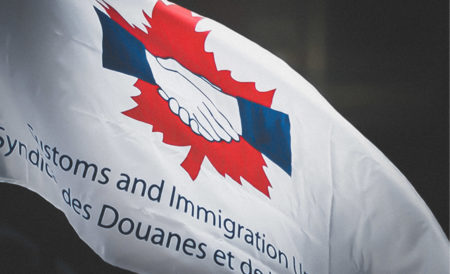PSAC/CIU Border Services members continue to play a pivotal role in Canada’s response to COVID-19, repatriating Canadians returning home from abroad and screening travellers at the border.
Despite their ongoing efforts, CBSA management still refuses to make meaningful progress towards a new collective agreement for more than 9,000 border services officers, investigators and headquarters staff.
During bargaining via teleconference May 12-14, our PSAC/CIU bargaining team made it clear that it is time the government addresses core workplace issues we’ve raised in negotiations concerning excessive discipline in CBSA workplaces, and crucial scheduling issues. The same is true with respect to parity with the broader law enforcement community, including much-needed pension reform.
Telework
We also raised our telework proposals with the employer. Given the reality that so many of our members are now teleworking during this crisis, it only stands to reason that our collective agreement finally addresses this issue for our non-uniformed members.
Technological change
Our team spoke to our proposals concerning technological change. We are looking for language in our collective agreement that would ensure meaningful consultation with PSAC-CIU on any changes, and that no bargaining unit jobs be lost due to technological change. The COVID-19 crisis has again shown that machines cannot do the job of trained CBSA officers.
Workplace protections
CBSA rejected our proposals for protections against surveillance in CBSA workplaces and when officers are asked to remove their tools. We explained that we are maintaining our position on these issues. New protections are needed against CBSA management in our collective agreement.
PSAC prepared to take legal action against CBSA
Recently, CBSA announced its plan to unilaterally change scheduling practices in Toronto, despite opposition from the union and our members. As a result, PSAC put Treasury Board/CBSA on notice this week that it will take legal action if such changes are implemented.
Our team also indicated that PSAC legal counsel will take action should CBSA proceed with changes to the escort and removal procedures that undermine our work and our rights under the collective agreement. We will uphold our rights.
Parity with law enforcement community
Our review of recent law enforcement wage settlements across Canada is ongoing – including our monitoring of wage talks for a first collective agreement for RCMP officers. Wage trends for 1st Class Constables at the RCMP are critical for comparative analysis to our group. Once the analysis is complete, we will commence wage discussions with the employer.
We also raised with management this week the issue of employees being provided T2200 forms for claiming home office expenses with the Canada Revenue Agency. The employer indicated that it is working on the issue.
We are in the process of setting additional dates with the employer.
To review the package of proposals that we tabled as well as those of the employer, visit psacunion.ca/fb-group. We’ll continue to provide updates throughout the bargaining process. To see other updates on Treasury Board bargaining, check out psacunion.ca/treasury-board.
The original version of this article was first posted on the PSAC website.





